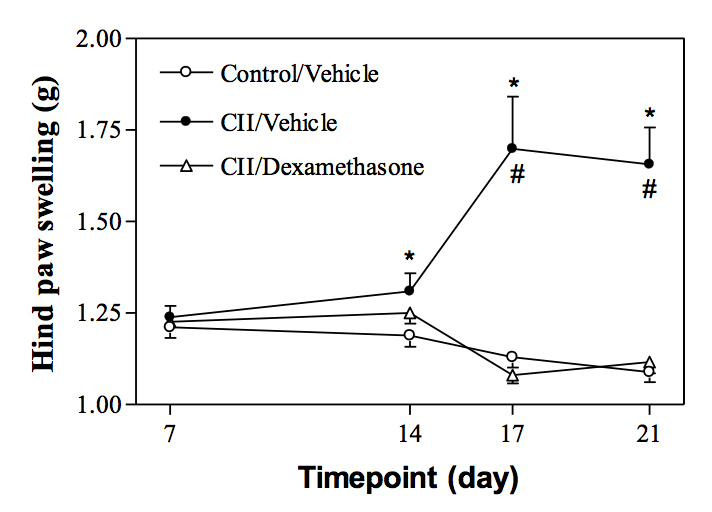RHEUMATOID ARTHRITIS
-
Rheumatoid arthritis (RA) is a widespread (prevalence 0.5–1%), chronic inflammatory disease and has several pathological features of autoimmune disease. The disease is characterized by cellular infiltration in synovial tissue, pannus formation, and both cartilage and bone erosion. RA leads to the destruction of cartilage and bone.
COLLAGEN - induced arthritis ( CIA ) in the rat
Collagen-induced arthritis (CIA) is an experimental model sharing several clinical and pathological features with RA. CIA has been used to study the pathogenesis of RA. This model is widely used to address questions of disease pathogenesis and to validate therapeutic targets. The chief pathological features of CIA include a proliferative synovitis with infiltration of polymorphonuclear and mononuclear cells, pannus formation, cartilage degradation, erosion of bone, and fibrosis. As in RA, TNFalpha and interleukin IL-1beta are expressed in the arthritic joints, and blockade of these molecules results in a reduction of disease severity.
-
Compound testing
Arthritis is induced in female Lewis rats using Bovine type II collagen (CII) emulsified in complete Freund’s adjuvant. Each rat is given CII emulsion at day 0. Seven days later, a second injection was carried out (boost injection). Arthritis is monitored at day 7, 14, 17 and 21 post-immunization using the hind paws swelling as parameter. The size of the hind paw is reflected by water displacement (in g), which increases with swelling. Compound testing addresses the effect of treatment (typically starting on day 14) on the hind paws swelling.
-
Endpoints
☐ Paw swelling
☐ Arthritis score
-

Collagen emulsion induced a significant hind paw swelling. Dexamethasone treatment (s.c., 1mg/kg, starting D14) is able to prevent this swelling. -
Other immune-driven inflammatory models also available :
- Models for Multiple sclerosis
- Model for Delayed-type hypersensitivity
- Models for Contact dermatitis
- Model for general inflammation
You could also be interested in
-
Relapsing/Remitting-EAE in the rat
Relapsing/Remitting Multiple Sclerosis is the most frequent form of Multiple Sclerosis.
Carrageenan air pouch
In vivo model that can be used to study acute and chronic inflammation.
-
Oxazolone-induced contact dermatitis
Oxazolone is an allergic contact dermatitis inducer resulting in a type I cytokine response
Ovalbumin-induced DTH
DTH is induced in female Lewis rats by subcutaneous injection of emulsion of ovalbumin / complete Freund's adjuvant.
